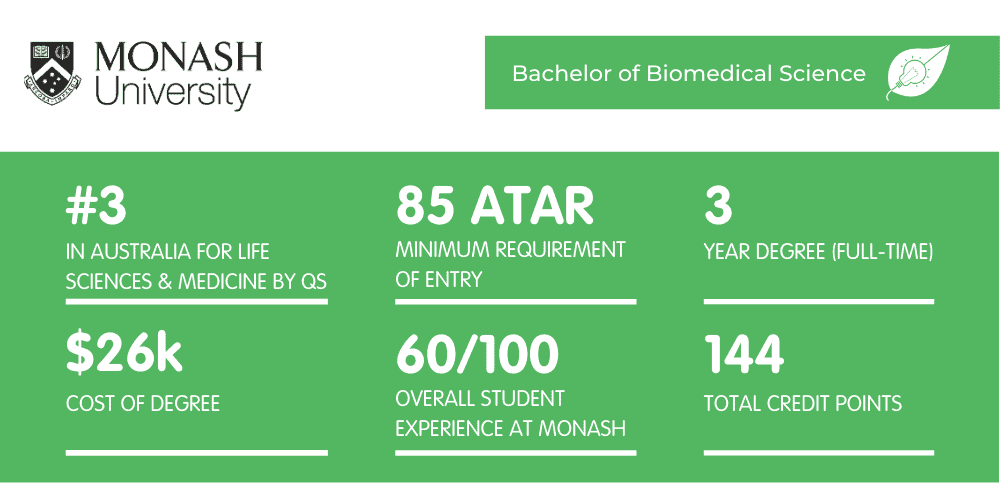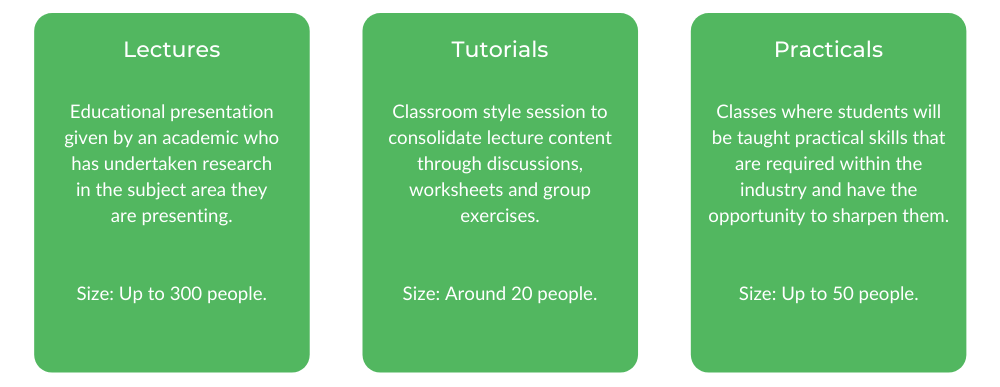
So, you’re interested in studying a Bachelor of Biomedical Science at Monash?
Well, you’ve come to the right place because we’re going to take you through everything there is to know about the degree including the different majors, assessments, uni culture, scholarships and more!
Let’s get started!
What is a Bachelor of Biomedical Science at Monash Uni?
Core Units for this Degree
How to Get into a Bachelor of Biomedical Science at Monash Uni
What’s the Teaching Format?
What’s the Faculty and Culture Like?
What is a Bachelor of Biomedical Science at Monash Uni?
A Bachelor of Biomedical Science at Monash provides you with a strong understanding of human health and disease as well as developing the skills you need for further research or a pathway into medicine!

You’ll cover five main topics throughout the degree including Molecular and Cellular Biology, Body Systems, Infection and Immunity, Disease and Society as well as Diagnostic and Research Tools. You’ll also have the chance to tailor the degree to your interests as you’ll complete eight electives.
If you’re thinking of pursuing medicine after completing a Bachelor of Biomedical Science, you can learn more about Medicine at Monash here!
Can it be studied as Honours or in conjunction with another degree?
There’s the chance for you to complete Honours which adds on an extra year of study. During this year, you’ll work on a research project on a topic of your choice related to Biomedical Science.
To be eligible, you need to have an average of 70% in at least 24 points during your final year.
There’s also the possibility to take your Biomedical Science degree to the next level by combining it with either Commerce, Engineering (Honours), Laws (Honours) or Science.
Career Paths
A Bachelor of Biomedical Science is a great pathway into medicine and can also lead on to further research in the field. Depending on what you’re most interested in, these are just some of the jobs you could find yourself working in:
-
- Biomedical scientist
- Clinical scientist
- Medical chemist
- Analytical chemist
- Microbiologist
- Research scientist
- Toxicologist
…and the list goes on!
Core Units for this Degree
Throughout the course of the degree, you’ll complete 14 core units and 8 electives.
The usual semester would include three core units and one elective. However, in your final year, you’ll have two double weighted core unit subjects which basically just means you spend more time on those subjects!
In the first year, you’ll cover basic science subjects like physics, microbiology, genetics and anatomy. Then in the second year, it gets a little bit more specialised so you’ll look at public health and bioinformatics.
The final year is more public health and research based where you’ll spend a whole semester doing a systematic review of literature on a certain topic (helps prepare you for after your degree and opens up doors for a career in research).
What subjects will you study?
The subject Medical Biophysics is all about how physics plays an important part in the functioning of the human body so you’ll look at a range of different physiological processes. Microbes in Health and Disease is a very interesting one as you’ll study infectious organisms and look at things like immunity, vaccines and so on.
The double weighted final year subject Biomedical Basis and Epidemiology of Human Disease is all about the impacts of human disease in society and for one the assessments, you’ll have to write a 4000 word systematic review on a topic (plus give a presentation) which really helps develop your research and communication skills.
Take a closer look at all the core subjects below!
-
- Biomedical Chemistry
- Cells, Tissues and Organisms
- Medical Biophysics
- Public Health and Preventive Medicine
- Human Neurobiology
- Molecular Biology
- Structure of the Human Body: An Evolutionary and Functional Perspective
- Human Molecular Cell Biology
- Body Systems
- Human Genetics
- Microbes in Health and Disease
- Introduction to Bioinformatics
- Molecular Mechanisms of Disease (double weighted third year subject)
- Biomedical Basis and Epidemiology of Human Disease (double weighted third year subject)
Electives
You get to complete eight electives over the three year degree and you can either choose electives that are relevant to your biomedical degree or you can select some inter-faculty electives as long as your eligible (it varies for each subject).
You can also use your electives to do a major or minor in a different discipline (but you don’t have to). For more info, check this out!
Internships
The degree doesn’t require you to do any internships however, there is nothing stopping you from finding your own one and getting some experience! Plus a lot of the lecturers and tutors still work in the industry so they definitely would have connections.
How to Get into a Bachelor of Biomedical Science at Monash Uni
With an ATAR of 85, you’ll have guaranteed entry into Biomedical Science at Monash university. However, in saying that, in 2020 there have been offers made for those who have an ATAR of 80.4.
Alternate Pathway
If you don’t get the required ATAR for this degree, there is another way — although it’s not as direct as guaranteed entry through ATAR; you’ll basically transfer from another degree.
To apply for this degree without relying on your ATAR, you’ll need to have completed at least one year of full-time study of a recognised university degree, achieving a minimum average mark of 70%. If possible, you might also want to study some of the first year core units in your other degree so that some of the credits can be transferred!
So it will take some work, but if Biomedical Science is what you’d like to study, the effort will be worth it!
Learn more about pathways into this degree here (look below ‘Entry Requirements’)!
Are there any prerequisites?
To be eligible for the course, you need to have completed:
-
- English units 3 & 4: scored at least 27
- Maths units 3 & 4: scored at least 25
- Science units 3 & 4: scored at least 25 in Chemistry
Scholarships
There are all sorts of different scholarships you can apply for at Monash which can be found here!
It’s definitely worth checking out the Biomedicine Discovery Scholarship for high achieving students who are enrolled in or plan to enrol in a Bachelor of Biomedical Science!
What’s the Teaching Format?
A Bachelor of Biomedical Science at Monash is taught through lectures, tutorials and pracs (depending on the subject). Now, take a breath, these are all taught through semesters!
Class Structure

Lectures
You could have anywhere up to 300 people in a lecture and these go for an hour. You’ll usually hear from experts relating to whatever topic you’re studying.
Tutorials
You’ll have around 20 people in each tutorial and these usually go for two hours! These are fairly small and interactive with group work based on the lecture content.
It really depends on the subject but you’ll sometimes have group discussions, sets of questions to work through and answer, small presentations and of course, time for your tutors to answer any questions you may have!
Pracs
Sometimes you’ll have pracs for subjects like genetics, physics, microbiology and anatomy which are a bit more hands-on. You can expect to have anywhere up to 50 people in the pracs and they go for 2-3 hours.
How much time do you spend on campus?
If you study a Bachelor of Biomedical Science at Monash full-time, you’ll usually take four subjects a semester. So, you can expect to have around 20 contact hours a week!
Plus, don’t forget, you’ll also have to do a fair bit of work in your own time — studying, homework, exam preparation and assignments.
What are the assessments like?
There’s quite a mix! Usually you can expect to have at least one exam per subject and a few quizzes along the way too.
Then there’s a few assignments on top of that throughout the semester which could include oral presentations, report writing, literature reviews and group assignments!
In terms of assessments for the pracs, you often have to write up a report and submit it after the class — sometimes this was done in groups but usually individually.
Skills That You Refine and Learn

Well, of course, you develop your scientific knowledge and skills! On top of that, you’ll refine your communication skills because there is a big emphasis on oral presentations so you learn how to communicate information to a lay person.
You’ll also write up lab reports and systematic reviews which helps to refine your written communication and research skills! There are a fair few group assignments so you’ll learn how to effectively work in a team.
What’s the Faculty and Culture Like?
There’s no doubt that it is a fairly competitive degree because a lot of people study Biomedical Science as a pathway into medicine. However, everyone usually supports each other and when you find your group of people, you’ll study and prepare for exams together and get to enjoy the campus life together. So, it’s definitely worth putting yourself out there and getting involved!
Biomed Society
You’ll definitely want to check out and join the Biomed Society at Monash because it will provide you with both academic and social opportunities! It’s also a great place to easily make friends when you first start the degree.
There’s a first and second year camp, the Mystery Bus which is a night of surprises at different Melbourne locations, pub crawls, bar nights and of course, the much beloved Biomed Ball!
In terms of academic and networking events, there are Industry Nights, Corporate Cocktails where you get to network with and hear from industry professionals plus various information sessions which prepare you for going into medicine!
Biomedical Science Peer Mentoring
This is a great program as all first-year Biomedical science students are matched with an older Biomedical science student! They’ve been exactly in the same position as you and have made that transition from high school to uni so they really know what it’s like!
Your mentors will help you settle into uni and are there as a point of contact if you have any questions about uni life, the faculty, the degree or the assessments! There are also some fun social events and professional development workshops for you and your mentors to attend (this is also a great way to connect with more people and make new friends).
Interested in the pros and cons of this degree? Check out our article here!
Tanna Nankivell is a Senior Content Writer at Art of Smart Education and is currently in Germany completing a year of study for her double degree in Communications (Journalism) and Bachelor of Arts (International Studies). She has had articles published on Central News – the UTS Journalism Lab and wrote a feature piece for Time Out Sydney during her internship. Tanna has a love for travel and the great outdoors, you’ll either find her on the snowfields or in the ocean, teaching aqua aerobics or creating short films.


